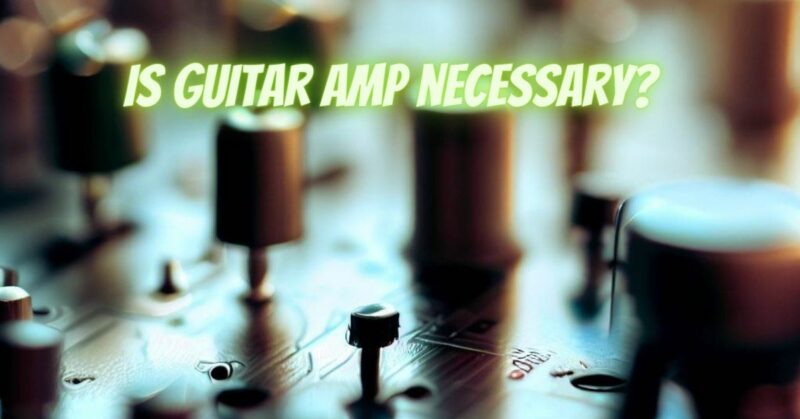Guitar amplifiers are iconic components of the rock ‘n’ roll landscape, but many budding guitarists wonder whether owning one is a necessity or merely an option. In this article, we’ll explore the role of a guitar amplifier, when it’s essential, and when it might be considered optional.
Understanding Guitar Amplifiers
A guitar amplifier, often referred to as an “amp,” is an electronic device designed to amplify the sound produced by an electric guitar. These amplifiers come in various shapes and sizes, ranging from small practice amps to powerful stage amplifiers used by professional musicians.
When is a Guitar Amplifier Necessary?
- Electric Guitars: If you play an electric guitar, a guitar amplifier is essential. Electric guitars have pickups that convert the string vibrations into electrical signals. These signals are then sent to the amplifier, which boosts them into audible sound. Without an amplifier, the sound produced by an electric guitar is barely audible.
- Volume Control: Amplifiers provide control over the volume of your guitar. Whether you’re practicing quietly at home or performing on stage, an amplifier allows you to adjust the volume to suit your needs.
- Tone Shaping: Amplifiers offer tone controls like bass, midrange, and treble, allowing you to shape the sound of your guitar. This control is vital for achieving various tones and effects.
- Effects Integration: Many amplifiers come with built-in effects, such as reverb, delay, and distortion. These effects can significantly enhance your guitar’s sound and versatility.
- Sound Projection: If you plan to play with other musicians or in front of an audience, an amplifier is crucial for projecting your guitar’s sound effectively.
When Might a Guitar Amplifier Be Optional?
- Acoustic Guitars: Acoustic guitars have a hollow body and produce sound without the need for amplification. However, there are acoustic amplifiers available that can enhance the volume and tone of acoustic guitars when necessary.
- Silent Practice: If you’re practicing quietly and don’t want to disturb others, you can use headphone amplifiers or amp modelers that simulate amplifier sounds through headphones.
- Recording: In a recording studio, you can often bypass the need for a traditional guitar amplifier by using direct recording techniques, amp modelers, or amp simulation software.
Choosing the Right Guitar Amplifier
When selecting a guitar amplifier, consider your playing style, intended use, and budget. Here are some factors to keep in mind:
- Amplifier Type: There are various amplifier types, including tube amps, solid-state amps, and modeling amps, each with its own tonal characteristics and features.
- Wattage: The wattage of an amplifier determines its power and volume capabilities. Choose an amplifier with an appropriate wattage for your needs.
- Portability: Consider whether you need a compact practice amp or a larger amplifier for stage performances.
- Tone and Effects: Look for amplifiers that offer the tone and effects you desire to match your musical style.
For electric guitarists, a guitar amplifier is typically a necessity for amplifying and shaping the sound of their instrument. However, for acoustic guitarists and those looking for alternative solutions for quiet practice or recording, a guitar amplifier might be considered optional. The choice ultimately depends on your playing style, goals, and preferences. Regardless of your choice, amplifiers remain an integral part of the musical world, contributing to the unique tones and sounds that have defined countless genres of music.


